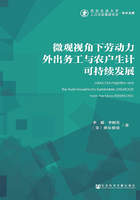
ABSTRACT
As a family decision, the labor out migration of rural households is a major characteristic of recent population development in China, as well as a major livelihood activity influenced by the risky nature of rural production and the difficulties of self insurance in lowincome rural setting. These changes have had complicated but significant impacts on rural households' capital level and configuration. From the perspective of sustainability, the impact of migration on the migrants'households of origin should be received increased attention in view of the potential role that it can play in bring both opportunity and challenge to the poor family of origin. In fact, incomes from these other activities by family members left behind depend on household's capability to allocate and transfer its resources after migration. Especially in the poor areas, the limitation of this self-development capability contributes to poverty and constrains households' ability to improve their economic power. The theory and principle of sustainable livelihood provides a micro-level and system perspective for fully understanding the household decision in terms of the household dynamics and households'livelihood in low-income areas.
Based on the principle and theory of Sustainable Livelihoods Framework, this paper brings migration perspective into the Sustainable Livelihoods Framework and improves the Rural Household Model to analyze the influence of labor out-migration in western China mountain area on households' livelihood in terms of livelihood capitals, production strategy and expenditure strategy in sending community. Employing the survey data of 1074 households from Qinling mountain area in 2008, it examines the effect of local and out migration on livelihood. The analysis may contribute to the development of an approach to improving household livelihood in remote mountain areas of western China.